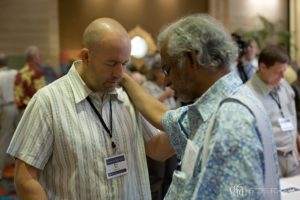
 Two men went to the temple to approach God in prayer and seek His favor. One, a Pharisee very sure of his outstanding spiritual achievements, recounted to God his flawless service record. He even thanked the Lord that he was better than others, especially that tax gatherer over there. This other man didn’t dare lift his head. He stood at a distance and pleaded guilty as a sinner, asking God for mercy (see Luke 18:9–14).
Two men went to the temple to approach God in prayer and seek His favor. One, a Pharisee very sure of his outstanding spiritual achievements, recounted to God his flawless service record. He even thanked the Lord that he was better than others, especially that tax gatherer over there. This other man didn’t dare lift his head. He stood at a distance and pleaded guilty as a sinner, asking God for mercy (see Luke 18:9–14).
It is obvious that the Pharisee, though his outward behaviors may have looked good, was full of pride. And in contrast, the tax collector was quite aware of his unworthiness and was sincerely humble.
It is important to note: Lack of humility is the proof of counterfeit spirituality. The Pharisee thought he had everything so right, but his “spirituality” was not authentic. So many people have so many things to say about the Lord and their walk, but there is a sense that there is nothing real in the spiritual life they’re portraying. The mark of humility is missing. True spiritual maturity will be marked with humility. After 20 years of preaching and a life of hardship and sacrifice, Paul said with a sincere heart, “I am the chief of sinners” (see 1 Timothy 1:15).
Having that mark of humility is God’s plan for all of us as believers. But often we all still experience a lack of respect and love for mankind. We can be insensitive to people’s feelings and indifferent to their circumstances. It can show up as hidden anger, impatience, irritation, bitterness and a tendency to quickly pass judgment. If we analyze these feelings and actions, we find that all of them have their roots in pride. Like the Pharisee in Jesus’ story, we feel superior in some area, and we aren’t able to manifest the long-suffering love of Christ in our relationships.
In contrast, Christ dealt with people in humility. During His earthly life, He sought to lift others up, even when He confronted them with their problems. He never looked for opportunities to gain a higher position, more respect or greater honor for Himself. That’s why He could tell His disciples to follow His example and be servants of all, to choose the last seat instead of the first and most prestigious.














